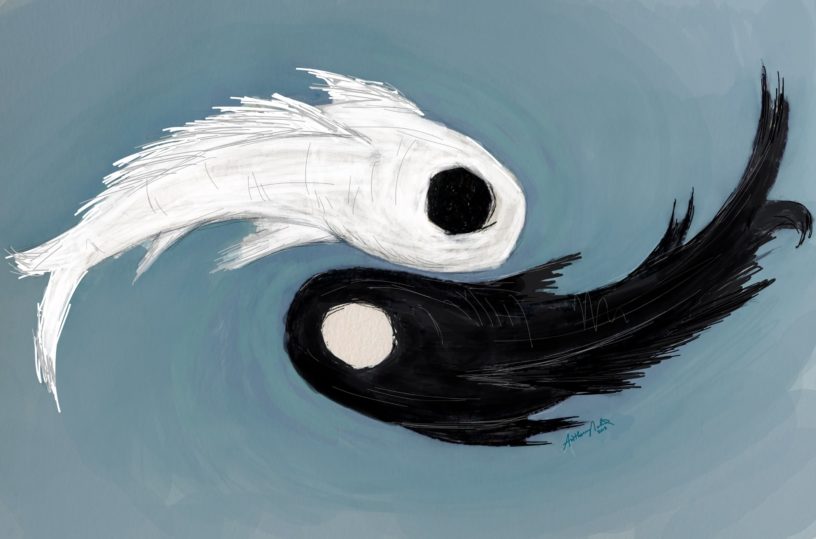Whether pleasure or pain: every situation in your life serves a purpose. It is up to us to recognize what that purpose could be.
Steve Maraboli
The idea of Yin and Yang is the principle that opposites exist alongside and within one another – there is light within darkness and darkness within light, good in the bad and bad in the good. It’s the dance between the two that creates a balance in life. There are many ways to approach life, but we tend to grow the most when we focus on finding the light in the darkest situations. You’ve probably seen the impact of mindset before. You’ll see a cancer patient who still radiates positivity and inspiration despite what they face or someone who seemingly has it all who is in mental anguish. It’s all a state of mind.
No matter what life throws at you, you have the power to determine how you see your circumstances and what meaning you will take from them. My life has been filled with events over the last two years that some, including myself a couple years back, saw to be nothing but detrimental to my path and happiness in life. However, becoming sick, being let go from my job, and moving back in with my family has led me to some of the most profound internal transformations. I have found a greater sense of purpose and fulfillment, and these situations have brought some of the most incredible people I’ve ever met into my life.
I now try to see both the good and bad in any situation and by choosing how I view it, pausing before I react to my initial instinct to it, I find even in life’s most troubling times there’s something to learn. There’s an old Chinese fable that highlights how no event in itself can be judged as good or bad.
A farmer and his son had a beloved stallion who helped the family earn a living. One day, the horse ran away and their neighbors exclaimed, “Your horse ran away, what terrible luck!” The farmer replied, “Maybe so, maybe not. We’ll see.”
A few days later, the horse returned home, leading a few wild mares back to the farm as well. The neighbors shouted out, “Your horse has returned, and brought several horses home with him. What great luck!” The farmer replied, “Maybe so, maybe not. We’ll see.”
Later that week, the farmer’s son was trying to break one of the mares and she threw him to the ground, breaking his leg. The villagers cried, “Your son broke his leg, what terrible luck!” The farmer replied, “Maybe so, maybe not. We’ll see.”
A few weeks later, soldiers from the national army marched through town, recruiting all the able-bodied boys for the army. They did not take the farmer’s son, who was still recovering from his injury. Friends shouted, “Your boy is spared, what tremendous luck!” To which the farmer replied, “Maybe so, maybe not. We’ll see.”
As this fable shows, a situation is not always as it seems, and we may not know what will come from it down the road. Rather than jumping to a judgment of it, try to bring yourself back to a centered place where you can examine all sides of the situation. That way you can eliminate blind spots and be more open to what it has to teach you. When I first got sick I only saw the fact that I had to leave my job, friends, and new city all while in incredible pain. However, as I’ve practiced not labelling any situation as inherently good or bad, I’ve found much more happiness and far more opportunities to learn and grow as a person.
Exercise on Finding the Good in the Bad:
Begin by making a list of some of the biggest events that changed your life, both good and bad, and how they impacted you. As you create this, you may begin to see a pattern that situations you originally thought had hampered your life like an illness, a lost job, or a breakup actually became incredible opportunities to learn more about yourself or opened a door into a future you never had imagined. Whereas some of the best moments in your life also had a downside to them.
If you don’t see these at first, take some more time to focus on what you could have learned or see where it could have taken you. Then see how current life circumstances are giving you that same chance to learn. The more you practice this, the better you’ll be able to do it in real-time and take advantage of perceived failures or losses.
As you begin to see the yin and yang of these events, you’ll be able to find a more centered space within yourself during both the peaks and valleys of life. This doesn’t mean that you won’t be immune to suffering in life but it will allow you to appreciate the good even more and when you do face obstacles. Rather than see them as something to just get through, you’ll soon see the opportunities to grow within them. That’s what challenges in life are meant to do. Even if sometimes it feels like they break us down to our core foundation, they are meant to bring out the best in who we are.

